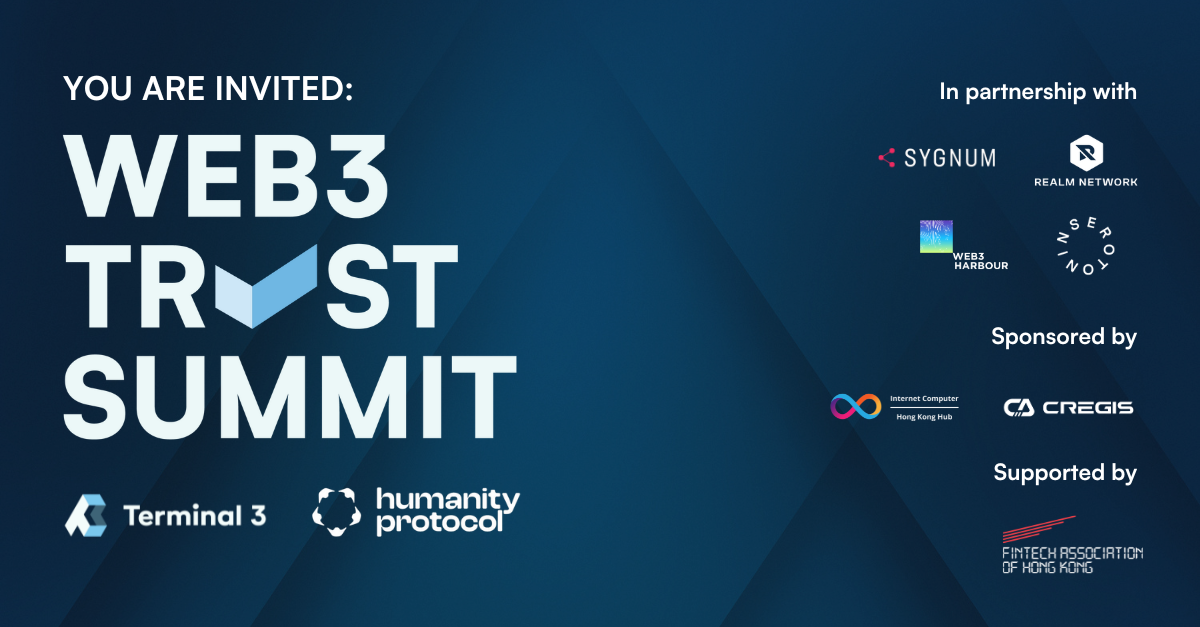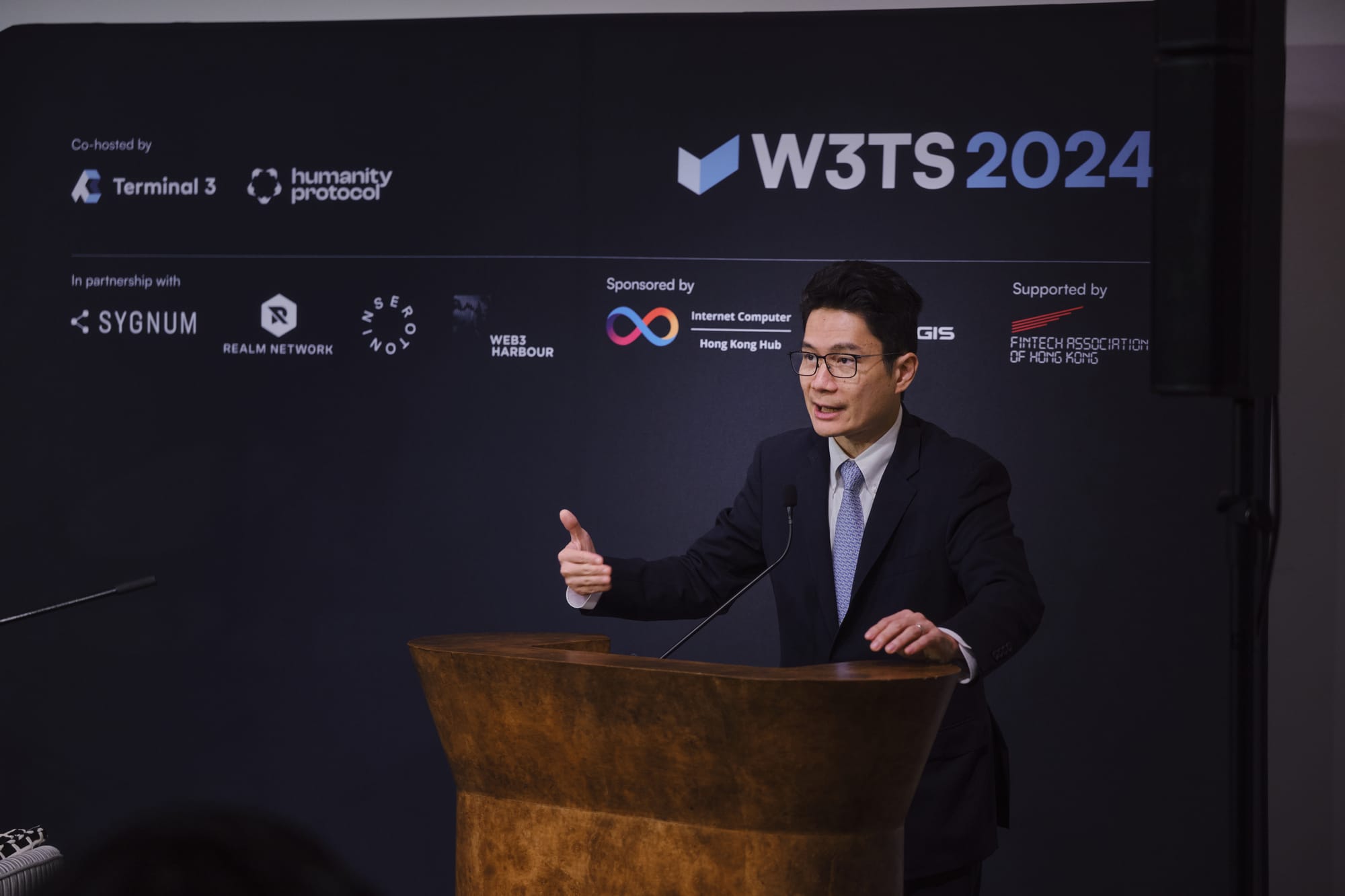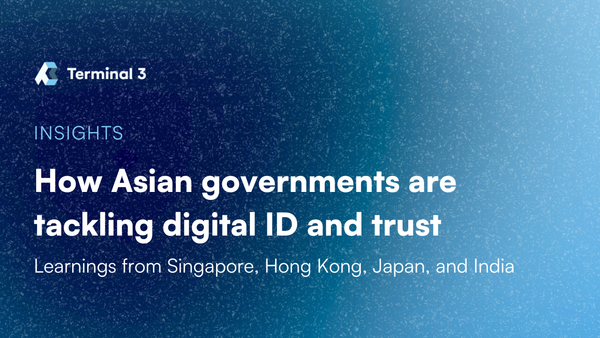W3TS24 Highlights: Building Trust in a Digital World
ICYMI: Learnings from the 2024 Web3 Trust Summit in Hong Kong

On November 1, Terminal 3 and Humanity Protocol hosted the Web3 Trust Summit to close off the 9th Hong Kong Fintech Week and the inaugural edition of Blocktober 2024. The Summit brought together industry leaders and regulators for an afternoon of insightful discussion on digital assets under the lenses of RegTech, Trust, and Identity.

With two panels featuring Web3 and regulatory experts, a live podcast recording featuring Mathias Imbach of Sygnum Bank, and a VIP Luncheon with Under Secretary Joseph HL Chan and Invest Hong Kong ADG Charles Ng as our Guests of Honour, the Summit was the perfect way to complement the excitement and energy in the city around Web3 during the earlier part of the month.
Below, find key insights from the entire afternoon, including takeaways from Under Secretary Joseph Chan’s opening remarks on the future of digital assets in Hong Kong, only available for Terminal 3 newsletter subscribers.
Opening Remarks by Joseph Chan
Mr. Joseph Chan, Under Secretary for Financial Services and the Treasury, opened the Web3 Trust Summit, expressing the Hong Kong government's strong commitment to supporting Web3 and virtual asset innovation.

Key highlights:
- Developing accommodating regulatory frameworks: Hong Kong has introduced a licensing regime for virtual asset trading platforms and is developing legislation around stablecoins, aiming to finalize and submit it by year-end. A sandbox environment for stablecoin testing is already operational, allowing companies to actively engage with proposed regulatory frameworks.
- World’s first tokenization initiatives: Hong Kong’s issuance of tokenized green bonds set a global precedent, followed by further tokenized bond issues to promote cost efficiency and transparency. The government also backs the growth of tokenized ETFs and digital securities, linking traditional financial services with the Web3 ecosystem.
- Positive commitment to industry engagement: Chan underscored the importance of continued dialogue between the government and Web3 stakeholders to evolve regulatory standards and support innovation. The administration encourages companies to participate in forums, consultations, and sandbox trials to shape a responsible and resilient Web3 sector in Hong Kong.
The opening remarks emphasized Hong Kong's established status as Asia's leading financial hub. Chan noted that this environment provides Web3 companies access to a vibrant market of potential investors, partners, and clients. Specifically, the government's proactive regulatory approach is designed to foster a secure, transparent, and stable environment for virtual assets, with a clear intention to integrate traditional finance with emerging digital assets.
Mr. Chan concluded by inviting attendees to collaborate with Invest Hong Kong to explore opportunities in Web3, signaling Hong Kong’s intention to lead as a global Web3 and digital asset hub.
SMART CONTACT with Mathias Imbach
For the first session of the Summit, Matthias Imbach, Co-Founder and CEO of Sygnum Bank, sat down for a Founder-on-Founder conversation with Gary Liu, Co-Founder and CEO of Terminal 3 to end of the Blocktober series of conversations with SMART CONTACT.

Imbach shared insights on building and scaling Sygnum, the world’s first regulated digital asset bank, across Switzerland and Singapore. He discussed Sygnum’s pioneering approach to digital asset banking, emphasizing the importance of a regulatory framework that balances innovation with transparency and investor protection.
Key takeaways:
- Foundation and Philosophy: Sygnum was founded in 2017 by a team with a mix of institutional finance and crypto backgrounds. Their goal of building a regulated bank for digital assets was to bridge traditional and decentralized finance, ensuring security and legitimacy for institutional and retail investors alike.
- Navigating Regulation: Switzerland’s supportive regulatory stance in 2017 enabled early progress for Sygnum, setting a precedent for regulated crypto banking. A successful regulatory environment requires ongoing collaboration between the private sector and government, something Hong Kong could benefit from as it develops its Web3 regulatory frameworks.
- The Importance of Regulated Innovation: As a digital bank, Sygnum adheres to compliance measures, including the "travel rule" for crypto transactions, which can be improved by a standardized, global protocol. We need a realistic, scalable regulatory environment that accommodates both traditional finance practices and the unique aspects of digital assets.
- Self-Sovereignty and Institutional Custody: There needs to be a balance between empowering users with self-custody options and offering institutional custody for those who prefer the security of regulated financial entities. While Web3 principles advocate for full self-custody, many users still prefer traditional banking services to manage assets securely.
- Future in Hong Kong: Looking forward, Sygnum aims to expand into Hong Kong, though regulatory improvements are needed to support digital asset banking fully. Imbach believes Hong Kong’s openness to feedback from the Web3 community is promising and could position the city as a leading digital asset hub in Asia.
Imbach advised the industry to focus on humility, consistency, and educating the public about the practical benefits of Web3. He called for long-term commitments to build trust, advocating for responsible, sustainable innovation in digital finance.
SMART CONTACT is a podcast-recording with a live audience hosted by Web3 Harbour. SMART CONTACT 2024 is presented to you by Circle, with Invest Hong Kong supporting the Blocktober 2024 series of recordings. Look out for the full episode coming soon.
Panel: Reg Tech and Verifiable Identity for Digital Assets

Panelists:
- Andrew Crawford (Franklin Templeton)
- Michael Lau (Bullish)
- Joy Lam (Binance)
- Olivier Relandeau (Standard Chartered)
- Rita L. (RD Technologies)
Moderated by Brent Sellors (PwC China).
The Summit’s first panel hosted regulatory and institutional finance experts as they explored the critical role of identity in digital finance with a particular focus on RegTech and verifiable private identity for digital assets. Panelists shared insights on how identity verification and management can enable greater adoption, trust, and regulatory compliance in the digital asset ecosystem.
Key takeaways:
- Importance of Identity in Digital Assets: Identity verification is essential for both compliance (AML/KYC) and building trust among users, particularly in institutions aiming for regulatory compliance. Fragmented regulations create user friction but remain essential for legitimacy in the sector.
- Challenges with KYC/AML Standards: Current identity protocols, primarily focused on KYC, are still rooted in Web2 systems and introduce barriers to growth. While institutional clients are accustomed to extensive verification processes, broader user adoption needs streamlined, user-friendly approaches. The variability in regulatory requirements across regions also plays a role, making it challenging to apply consistent KYC standards globally.
- Technological Advances for Identity Verification: There is huge potential for blockchain and zero-knowledge proofs to enhance privacy and streamline identity verification. In the future, identity could be holistic, encompassing more than traditional KYC attributes to include user values and risk understanding, allowing for tailored investment offerings.
- Stablecoins and Global Regulatory Consistency: Inconsistent global regulations can limit liquidity and usability for cross-border transactions of stablecoins. Greater collaboration between jurisdictions could help create a more inclusive and seamless digital asset ecosystem.
- The Role of Decentralized and Self-Sovereign Identities: Self-sovereign digital identities, where individuals can verify their identity and ownership without disclosing excessive personal information, hold promise but may not be suitable for all users or applications, especially those requiring high regulatory oversight. However, they will have a crucial role in bridging Web2 and Web3 applications.
- Government Collaboration and Regulatory Clarity: More regulatory guidance is needed to support innovation while protecting users. Regulated financial institutions are embracing frameworks like Europe’s MiCA (Markets in Crypto-Assets), and believe they represent a step forward in balancing consumer protections with market accessibility.

Ultimately, the private sector and regulators need to remain engaged to create identity, privacy, and digital asset standards that support both industry growth and user protections.
Panel: Challenges and Solutions for Trust in a Decentralized Economy

Panelists:
- Minh Do (Animoca Brands)
- Terence Kwok (Humanity Protocol)
- Malcolm Ong (Terminal 3)
- Yifan He (Red Date Technology).
Moderated by Amanda Cassatt (Serotonin)
The final panel of the afternoon explored the future: what is in store for payments, identity, privacy, and AI in the context of Web3?
Key takeaways:
- The role of stablecoins and CBDCs in future payments: It is still unclear if stablecoins will dominate global payments. They have a growing role in streamlining cross-border transactions, however some, like Yifan, believe they most closely resemble corporate notes and might be restricted to use cases in closed ecosystems.
- Centralization vs. Decentralization around the world: As companies experiment with both centralized and decentralized solutions, it is likely that these models will converge. While centralization provides user-friendly experiences, decentralization allows greater control and privacy. User preference for centralized or decentralized solutions may vary geographically, with smaller, emerging economies favoring decentralized networks to access global markets.
- Trust and privacy in a decentralized future: There is a need for privacy mechanisms like zero-knowledge proofs (ZKPs) to enable compliant, anonymous transactions. Decentralized identity can help users control their own data, allowing verification without disclosing unnecessary information—a vision where privacy empowers trust.
- Identity verification for humans and AI: Projects like Humanity Protocol's are on a mission to create "proof of humanity," a mechanism to distinguish real humans from bots and AI. This proof would ensure that users are accountable and prevent AI from manipulating markets or other online systems. As AI technology advances, the need for verified human control over autonomous agents is increasingly essential.
- AI’s growing role and ethical implications: AI might soon manage tasks that are currently human-led, like financial trading. AI might develop its own trading algorithms, potentially outperforming humans. However, we need to take into account ethical considerations, and allow society to determine what is genuinely human and decide what values guide AI interactions.

While technology can empower users with privacy, security, and innovation, the balance between centralization and decentralization will be determined by evolving regulatory frameworks and user preferences. Identity and trust will be critical as AI and digital economies continue to integrate.
Takeaways
The Web3 Trust Summit served as a pivotal platform for discussing the future of digital finance in Hong Kong. With strong government support, innovative regulatory frameworks, and active engagement from industry leaders, the Summit underscored a collective commitment to fostering a secure and thriving Web3 ecosystem. As Hong Kong continues to position itself as a global leader in digital assets, the collaboration between regulators and innovators will be crucial in shaping the future landscape of finance.

A big thank you to our partners for making this event possible: Sygnum Bank, Realm Network (Animoca Brands), Serotonin, Web3 Harbour, Cregis, ICP Hub Hong Kong, and FinTech Association of Hong Kong.
About Terminal 3
Terminal 3 is Web3’s most powerful user identity and data oracle. Leveraging zero-knowledge cryptography, Terminal 3's enterprise-grade platform reduces the friction between financial ecosystems and for cross-border transactions with verifiable private identities that are interoperable and compliant with global regulations.
Learn more: terminal3.io




